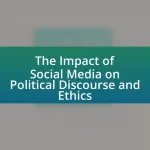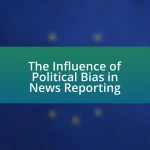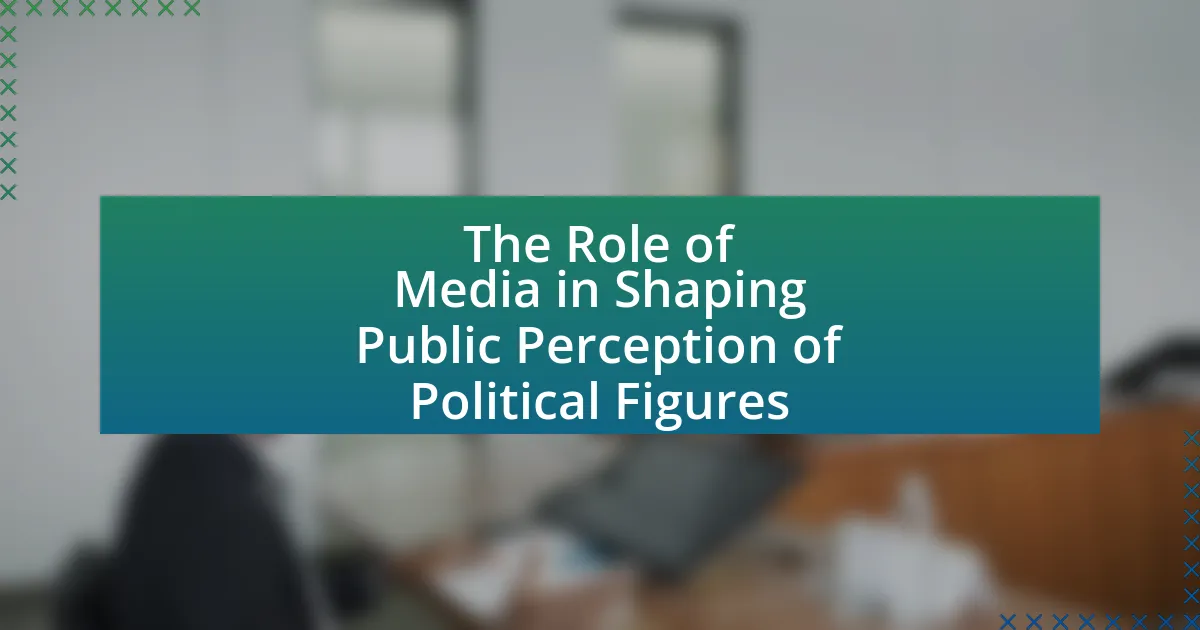The article examines the intersection of privacy and public interest in political reporting, highlighting the ethical dilemmas faced by journalists as they balance individual privacy rights with the public’s right to know. It discusses the impact of privacy laws, such as the General Data Protection Regulation (GDPR) and the California Consumer Privacy Act (CCPA), on the accessibility of information about public figures. The article also explores how journalists navigate these challenges, the role of public opinion in shaping media narratives, and the implications for the quality of political journalism. Additionally, it addresses future trends in legislation and technology that may influence the dynamics of privacy and public interest in political reporting.
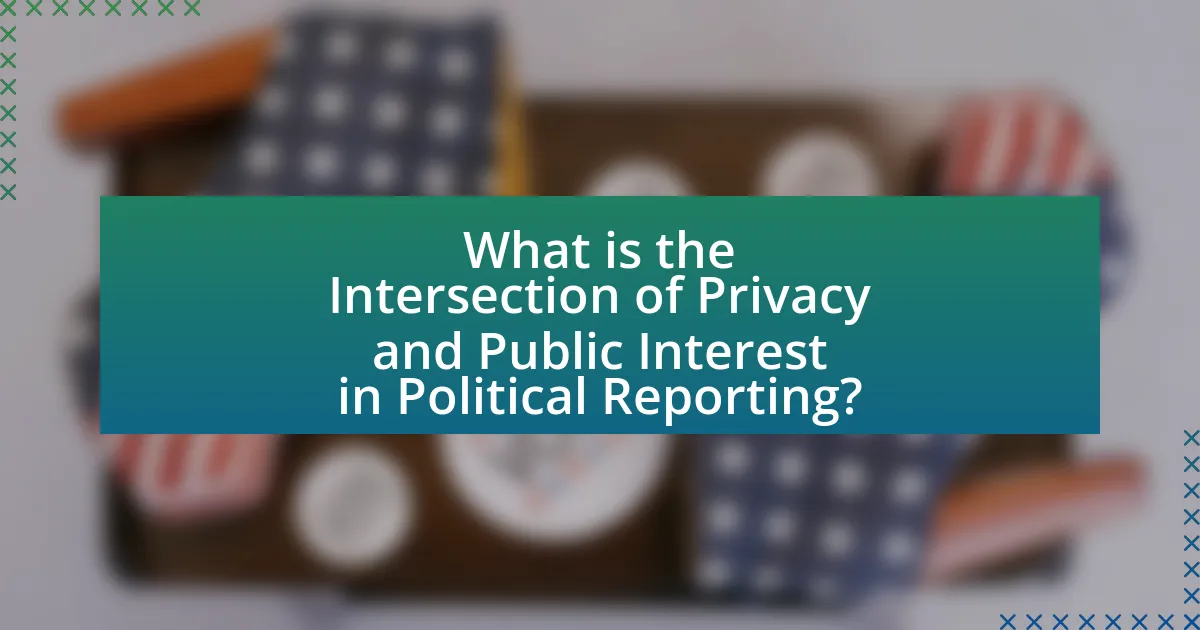
What is the Intersection of Privacy and Public Interest in Political Reporting?
The intersection of privacy and public interest in political reporting involves balancing the individual’s right to privacy against the public’s right to know about matters that affect governance and democracy. Political reporting often necessitates the disclosure of personal information about public figures to inform citizens about their actions and decisions, which can serve the public interest. However, this can infringe on the privacy rights of individuals, leading to ethical dilemmas. For instance, the U.S. Supreme Court case of Cox Broadcasting Corp. v. Cohn (1975) established that the media could publish information obtained from public records, underscoring the legal precedent that supports public interest over privacy in certain contexts. This dynamic continues to evolve as societal norms and legal frameworks adapt to new challenges in political reporting.
How do privacy concerns impact political reporting?
Privacy concerns significantly impact political reporting by limiting the information journalists can access and publish about public figures. When individuals in politics are aware of heightened privacy expectations, they may withhold information or restrict access to their personal lives, which can hinder transparency and accountability. For instance, the implementation of privacy laws, such as the General Data Protection Regulation (GDPR) in Europe, has made it more challenging for reporters to gather data on politicians without consent, thereby affecting the depth and breadth of political coverage. Additionally, fear of legal repercussions or backlash from privacy violations can lead media outlets to self-censor, ultimately shaping the narrative and public discourse around political issues.
What are the key privacy laws affecting political reporting?
The key privacy laws affecting political reporting include the General Data Protection Regulation (GDPR) in the European Union, the California Consumer Privacy Act (CCPA) in the United States, and various state-level privacy laws. GDPR regulates the processing of personal data and grants individuals rights over their data, impacting how political entities collect and report information. CCPA enhances privacy rights for California residents, requiring transparency in data collection practices, which influences political reporting in that state. Additionally, laws like the Privacy Act of 1974 in the U.S. govern the handling of personal information by federal agencies, affecting how political data is managed and reported. These laws collectively shape the landscape of political reporting by imposing restrictions on data usage and ensuring accountability in the handling of personal information.
How do journalists navigate privacy issues in their reporting?
Journalists navigate privacy issues in their reporting by balancing the public’s right to know with individuals’ rights to privacy. They often assess the relevance of the information to the public interest, considering factors such as the significance of the story, the potential harm to individuals, and legal frameworks like privacy laws. For instance, the Society of Professional Journalists’ Code of Ethics emphasizes minimizing harm and respecting privacy unless there is an overriding public interest. This ethical guideline helps journalists make informed decisions about what information to publish while protecting individuals’ privacy rights.
Why is public interest a crucial factor in political reporting?
Public interest is crucial in political reporting because it ensures that the information disseminated serves the needs and rights of the public, promoting transparency and accountability in governance. Political reporting that prioritizes public interest helps citizens make informed decisions, thereby strengthening democracy. For instance, investigative journalism that uncovers corruption or abuse of power directly impacts public awareness and can lead to political reform. Studies have shown that when media outlets focus on issues of public concern, such as government accountability, they contribute to higher civic engagement and trust in democratic institutions.
What defines public interest in the context of political news?
Public interest in the context of political news is defined by the necessity for transparency and accountability in governance, which serves the collective well-being of society. This concept is rooted in the idea that citizens have a right to access information that affects their lives, particularly regarding the actions and decisions of public officials. For instance, the U.S. Supreme Court has recognized that the public’s right to know about government operations is fundamental to a democratic society, as seen in cases like New York Times Co. v. Sullivan, which emphasizes the importance of free speech and press in informing the public. Thus, political news that reveals corruption, misconduct, or significant policy decisions is deemed to be in the public interest, as it empowers citizens to make informed choices and hold their leaders accountable.
How does public interest influence journalistic ethics?
Public interest significantly influences journalistic ethics by guiding journalists in determining what information is essential for the public to know. This ethical framework prioritizes transparency, accountability, and the public’s right to be informed, especially regarding issues that affect society at large, such as government actions or public health crises. For instance, the Society of Professional Journalists emphasizes that ethical journalism should serve the public interest, which includes reporting on matters that may not be favorable to those in power. This principle is evident in landmark cases like the Watergate scandal, where investigative journalism uncovered critical information that served the public’s right to know, ultimately leading to significant political consequences. Thus, public interest acts as a cornerstone for ethical decision-making in journalism, ensuring that the pursuit of truth aligns with the needs and rights of the community.
What are the challenges at the intersection of privacy and public interest?
The challenges at the intersection of privacy and public interest include balancing individual rights with societal needs, particularly in political reporting. Journalists often face dilemmas when reporting on public figures, as revealing private information can serve the public interest but may infringe on personal privacy rights. For instance, the legal framework surrounding privacy, such as the General Data Protection Regulation (GDPR) in Europe, imposes strict guidelines on data usage, complicating the ability of journalists to access and report information that could be crucial for public discourse. Additionally, the rise of digital surveillance and data collection practices raises concerns about how personal data is used and the potential for misuse, further complicating the ethical landscape for reporters. These challenges necessitate ongoing discussions about the ethical responsibilities of journalists and the legal protections afforded to individuals.
How do conflicting interests arise between privacy and public interest?
Conflicting interests arise between privacy and public interest when the need to protect individual privacy clashes with the societal demand for transparency and accountability. In political reporting, journalists often seek to expose information that serves the public good, such as government misconduct or corruption, which may require disclosing private details about individuals involved. For instance, the release of information about a politician’s private life can be justified if it reveals actions that impact public trust or governance. However, this can infringe on the individual’s right to privacy, leading to ethical dilemmas. The balance between these interests is often debated, as seen in cases like the 2013 Edward Snowden revelations, where national security concerns were weighed against the public’s right to know about government surveillance practices.
What are the consequences of prioritizing one over the other?
Prioritizing privacy over public interest in political reporting can lead to a lack of transparency and accountability in governance. When journalists focus primarily on protecting individual privacy, they may withhold critical information that the public needs to make informed decisions about their leaders and policies. For instance, the Watergate scandal highlighted the importance of investigative journalism in exposing governmental misconduct, demonstrating that prioritizing public interest can lead to significant political reform. Conversely, if public interest is prioritized over privacy, it can result in invasions of personal lives, potentially discouraging individuals from participating in public life or sharing information that could be vital for democratic processes. Balancing these priorities is essential to ensure both accountability and respect for individual rights in political discourse.
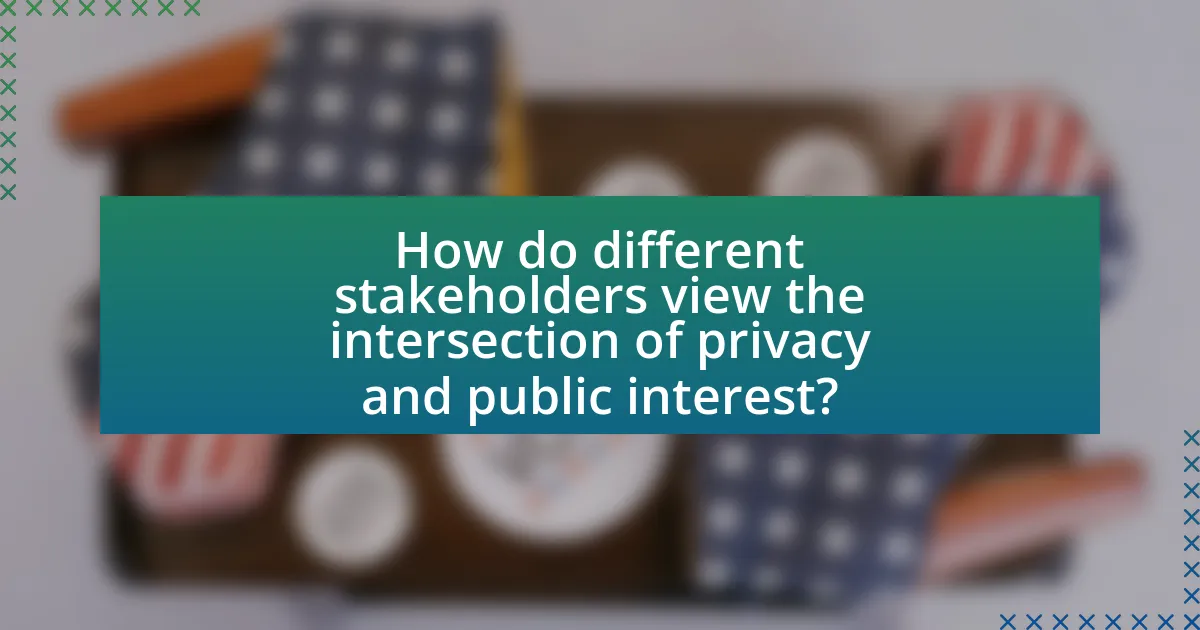
How do different stakeholders view the intersection of privacy and public interest?
Different stakeholders view the intersection of privacy and public interest through varying lenses, often influenced by their roles and objectives. Journalists prioritize public interest, arguing that transparency in political reporting is essential for democracy, as evidenced by the role of investigative journalism in exposing corruption. Conversely, politicians and public officials often emphasize the need for privacy to protect sensitive information and personal safety, citing instances where public exposure has led to harassment or threats. Privacy advocates argue that individual rights must be safeguarded against invasive reporting practices, highlighting cases where personal data was misused in the name of public interest. This complex dynamic illustrates the ongoing tension between the necessity of public accountability and the protection of individual privacy rights.
What perspectives do journalists have on privacy and public interest?
Journalists generally view privacy and public interest as a complex balancing act, where the need to inform the public must be weighed against individuals’ rights to privacy. This perspective is shaped by ethical guidelines and legal frameworks that govern journalism, which emphasize the importance of transparency and accountability in public figures while also recognizing the potential harm that can arise from invasive reporting. For instance, the Society of Professional Journalists’ Code of Ethics advocates for minimizing harm, suggesting that journalists should consider the implications of their reporting on individuals’ privacy. Additionally, landmark cases such as the Supreme Court’s decision in “New York Times Co. v. Sullivan” highlight the legal precedence for protecting public interest in reporting on public figures, reinforcing the notion that while public interest can justify certain disclosures, it does not grant carte blanche to disregard privacy rights.
How do journalists justify their reporting decisions regarding privacy?
Journalists justify their reporting decisions regarding privacy by balancing the public’s right to know with individuals’ rights to privacy. They often argue that information is reported when it serves a significant public interest, such as exposing corruption or informing citizens about government actions. For instance, the Society of Professional Journalists emphasizes ethical guidelines that prioritize transparency and accountability, suggesting that when the public interest outweighs privacy concerns, reporting is justified. Additionally, legal frameworks, such as the First Amendment in the United States, support the notion that freedom of the press allows for the dissemination of information that is crucial for democratic governance, further validating their decisions.
What role does audience perception play in these decisions?
Audience perception significantly influences decisions in political reporting by shaping the narrative and determining what information is deemed relevant or acceptable. Journalists and media outlets often consider how their audience will react to certain stories, which can lead to a prioritization of sensationalism or the omission of sensitive details to maintain public trust. For instance, a study by the Pew Research Center found that 62% of Americans believe that news organizations should avoid publishing information that could harm individuals’ reputations, indicating that audience sentiment directly impacts editorial choices. This interplay between audience perception and reporting decisions underscores the delicate balance between privacy and public interest in journalism.
How do politicians and public figures respond to privacy concerns in reporting?
Politicians and public figures typically respond to privacy concerns in reporting by advocating for a balance between transparency and individual privacy rights. They often emphasize the importance of public interest in holding them accountable while simultaneously calling for ethical journalism practices that respect personal boundaries. For instance, many politicians have supported legislation aimed at protecting personal data and privacy, such as the General Data Protection Regulation (GDPR) in Europe, which sets strict guidelines on data collection and usage. This dual approach reflects their recognition of the need for accountability in public life while also acknowledging the potential harm of invasive reporting on their personal lives.
What strategies do public figures use to protect their privacy?
Public figures employ various strategies to protect their privacy, including legal measures, controlled public appearances, and social media management. Legal measures often involve using defamation laws and privacy rights to combat invasive reporting. Controlled public appearances allow them to dictate the context and content of their interactions with the media, minimizing unplanned exposure. Additionally, managing social media presence enables public figures to curate their online image and limit personal information shared with the public. These strategies are essential for maintaining a degree of privacy in the face of public scrutiny and media attention.
How do public figures balance transparency with privacy?
Public figures balance transparency with privacy by selectively sharing information that fosters public trust while protecting personal boundaries. They often disclose details about their professional activities and policy positions to maintain accountability, while keeping aspects of their personal lives private to safeguard their well-being and that of their families. For instance, public figures may engage in controlled media interactions and social media strategies that highlight their work without revealing sensitive personal information. This approach is supported by the understanding that excessive transparency can lead to scrutiny that infringes on personal privacy, as evidenced by numerous cases where public figures faced harassment due to invasive media coverage.
What is the role of the public in shaping the discourse on privacy and public interest?
The public plays a crucial role in shaping the discourse on privacy and public interest by actively engaging in discussions, advocating for policy changes, and influencing media narratives. Public opinion can drive legislative action, as seen in the aftermath of high-profile data breaches, where citizen outcry led to stronger privacy regulations like the General Data Protection Regulation (GDPR) in Europe. Furthermore, social movements and grassroots campaigns raise awareness about privacy issues, prompting media outlets to cover these topics more extensively, thereby shaping the overall narrative. This dynamic interaction between the public and media ensures that privacy concerns remain a focal point in discussions about public interest, ultimately influencing how policies are formulated and implemented.
How does public opinion influence media coverage of political issues?
Public opinion significantly influences media coverage of political issues by shaping the narratives that journalists prioritize and the angles they adopt. When a substantial portion of the public expresses strong opinions on specific political matters, media outlets often respond by amplifying those issues to attract viewership and maintain relevance. For instance, during the 2020 U.S. presidential election, polling data indicated that voters were particularly concerned about healthcare and the economy, leading major news organizations to focus their coverage on these topics extensively. This alignment with public sentiment is driven by the media’s need to engage audiences, as reflected in studies showing that stories aligned with public interest receive higher engagement rates.
What actions can the public take to advocate for privacy rights in reporting?
The public can advocate for privacy rights in reporting by engaging in grassroots campaigns that promote awareness and understanding of privacy issues. These campaigns can include organizing community forums, participating in public discussions, and leveraging social media platforms to disseminate information about the importance of privacy in journalism. Research indicates that public support for privacy rights can influence policy changes; for example, a 2020 study by the Pew Research Center found that 81% of Americans feel they have little to no control over the data collected about them, highlighting the need for advocacy. By mobilizing collective action, individuals can pressure lawmakers to enact stronger privacy protections and hold media organizations accountable for ethical reporting practices.

What are the implications of the intersection of privacy and public interest in political reporting?
The intersection of privacy and public interest in political reporting raises significant ethical and legal implications. Journalists often face the challenge of balancing the public’s right to know against individuals’ rights to privacy, particularly when reporting on public figures. For instance, the publication of private information about politicians can lead to public scrutiny and accountability, but it may also infringe on personal privacy rights, as seen in cases like the exposure of private communications or personal lives of elected officials. Legal frameworks, such as the First Amendment in the United States, protect freedom of the press, yet they also require careful consideration of privacy laws to avoid potential legal repercussions. The implications extend to public trust in media; excessive invasion of privacy can erode credibility and lead to public backlash against media outlets. Thus, the intersection of these two domains necessitates a nuanced approach to ensure responsible reporting that respects individual privacy while serving the public interest.
How does this intersection affect the quality of political journalism?
The intersection of privacy and public interest significantly affects the quality of political journalism by creating a tension between the need for transparency and the protection of individual rights. This tension can lead to ethical dilemmas where journalists must navigate the fine line between informing the public and respecting the privacy of political figures. For instance, when reporting on political scandals, the public’s right to know may conflict with an individual’s right to privacy, potentially resulting in sensationalism or incomplete narratives that compromise journalistic integrity. Research indicates that when journalists prioritize public interest over privacy, it can lead to a decline in trust in media sources, as audiences may perceive reporting as invasive or biased. Thus, the balance between these two elements is crucial for maintaining the credibility and quality of political journalism.
What are the potential risks of compromising privacy for public interest?
Compromising privacy for public interest can lead to significant risks, including the erosion of individual rights, potential misuse of personal data, and a chilling effect on free speech. When privacy is sacrificed, individuals may face unwarranted scrutiny, harassment, or discrimination, as seen in cases where whistleblowers or activists have been exposed. Furthermore, the unauthorized sharing of personal information can result in identity theft or other forms of exploitation, as evidenced by numerous data breaches in organizations that prioritize public interest over privacy. Additionally, the fear of surveillance can deter individuals from expressing dissenting opinions, ultimately undermining democratic processes and public discourse.
How can responsible reporting enhance public trust in journalism?
Responsible reporting enhances public trust in journalism by prioritizing accuracy, transparency, and ethical standards. When journalists adhere to these principles, they provide reliable information that the public can depend on, fostering a sense of credibility. For instance, a study by the Pew Research Center found that 66% of Americans believe that news organizations should be held accountable for the accuracy of their reporting. This accountability builds trust, as audiences feel assured that the information they receive is fact-checked and unbiased. Furthermore, responsible reporting that respects privacy while serving the public interest demonstrates a commitment to ethical journalism, reinforcing the belief that journalists act in the best interest of society.
What best practices can journalists adopt to navigate this intersection effectively?
Journalists can adopt several best practices to navigate the intersection of privacy and public interest in political reporting effectively. First, they should prioritize transparency by clearly communicating the purpose of their reporting and the potential impact on individuals’ privacy. This approach fosters trust and allows subjects to understand the context of their coverage.
Second, journalists must conduct thorough research to distinguish between public interest and sensationalism, ensuring that the information reported serves a legitimate public need rather than merely attracting attention. For instance, the Society of Professional Journalists emphasizes the importance of minimizing harm, which includes considering the privacy of individuals involved in political stories.
Third, obtaining informed consent when possible is crucial. Journalists should seek permission from individuals before disclosing sensitive information, particularly when it pertains to private lives that do not directly relate to their public roles. This practice aligns with ethical guidelines set forth by organizations like the American Press Institute.
Lastly, journalists should engage in ongoing training regarding privacy laws and ethical standards to remain informed about the evolving landscape of privacy rights and public interest. This commitment to education helps journalists make informed decisions that respect individual privacy while fulfilling their duty to inform the public.
How can journalists ensure ethical reporting while respecting privacy?
Journalists can ensure ethical reporting while respecting privacy by adhering to established ethical guidelines, such as those set forth by the Society of Professional Journalists, which emphasize minimizing harm and respecting individuals’ privacy. This involves obtaining consent before publishing personal information, especially in sensitive situations, and weighing the public interest against the potential harm to individuals. For instance, when reporting on political figures, journalists should consider whether the information serves a legitimate public interest or merely satisfies curiosity. Ethical reporting also includes verifying facts and providing context to avoid misrepresentation, thereby fostering trust and accountability in journalism.
What guidelines exist for balancing privacy and public interest in political reporting?
Guidelines for balancing privacy and public interest in political reporting include adhering to ethical standards, ensuring transparency, and considering the relevance of information to the public. Journalists should prioritize the public’s right to know while respecting individuals’ privacy rights, particularly when reporting on sensitive issues. The Society of Professional Journalists emphasizes the need for journalists to minimize harm and to weigh the potential impact of their reporting on individuals against the public’s interest in the information. Additionally, legal frameworks, such as the Freedom of Information Act, provide guidelines on what information can be disclosed while also protecting certain private data. These guidelines help maintain a balance between the necessity of public discourse and the protection of individual privacy.
What future trends may emerge at the intersection of privacy and public interest?
Future trends at the intersection of privacy and public interest will likely include increased regulatory scrutiny on data collection practices and enhanced transparency requirements for organizations. As public awareness of privacy issues grows, governments may implement stricter laws to protect individual data rights, similar to the General Data Protection Regulation (GDPR) in Europe, which has set a precedent for privacy legislation. Additionally, advancements in technology, such as artificial intelligence and blockchain, may facilitate more secure data handling and empower individuals to control their personal information. These trends reflect a balancing act between safeguarding privacy and ensuring that public interest, particularly in political reporting, is maintained through responsible data use.
How might technology influence privacy concerns in political reporting?
Technology significantly influences privacy concerns in political reporting by enabling extensive data collection and surveillance. The rise of digital platforms allows for the aggregation of personal information, making it easier for political entities to track individuals’ behaviors and opinions. For instance, social media algorithms can analyze user interactions to create detailed profiles, raising ethical questions about consent and the potential for misuse of this data. Additionally, advancements in communication technologies, such as encrypted messaging and secure data storage, can both protect sources and complicate transparency, leading to a tension between safeguarding privacy and the public’s right to know. The Cambridge Analytica scandal exemplifies how technology can exploit personal data for political gain, highlighting the urgent need for regulations that balance privacy rights with the demands of political accountability.
What role will legislation play in shaping the future of political reporting?
Legislation will play a crucial role in shaping the future of political reporting by establishing guidelines that balance privacy rights with the public’s right to know. As governments enact laws regarding data protection and transparency, these regulations will directly influence how journalists gather, report, and disseminate information about political figures and events. For instance, the General Data Protection Regulation (GDPR) in Europe has already set a precedent for how personal data can be used, compelling media organizations to adapt their practices to comply with legal standards. This evolving legal landscape will likely lead to increased scrutiny of political reporting practices, ensuring that while the public remains informed, individual privacy is also respected.

